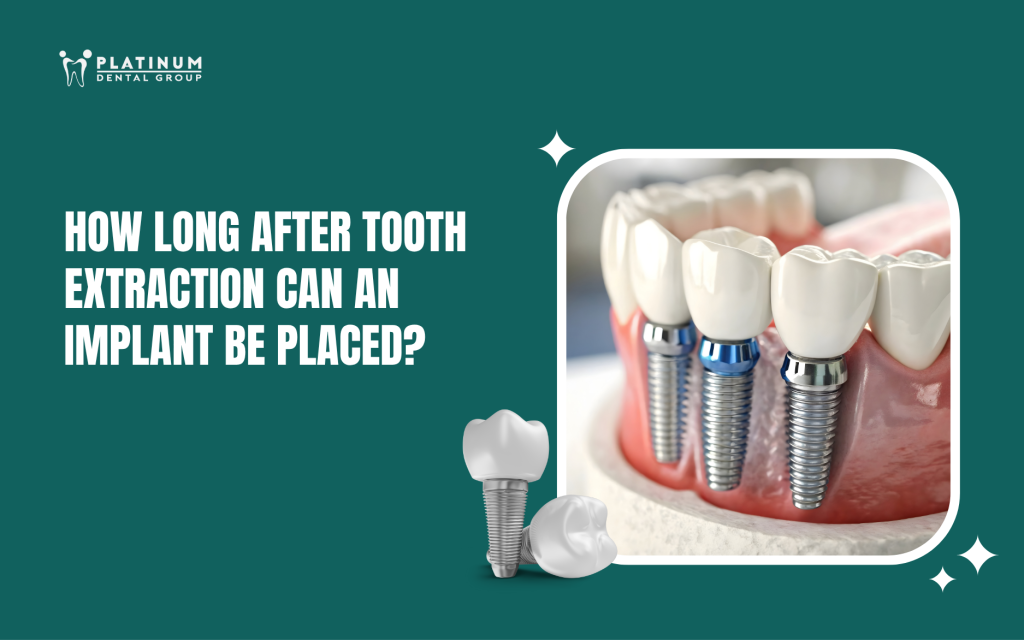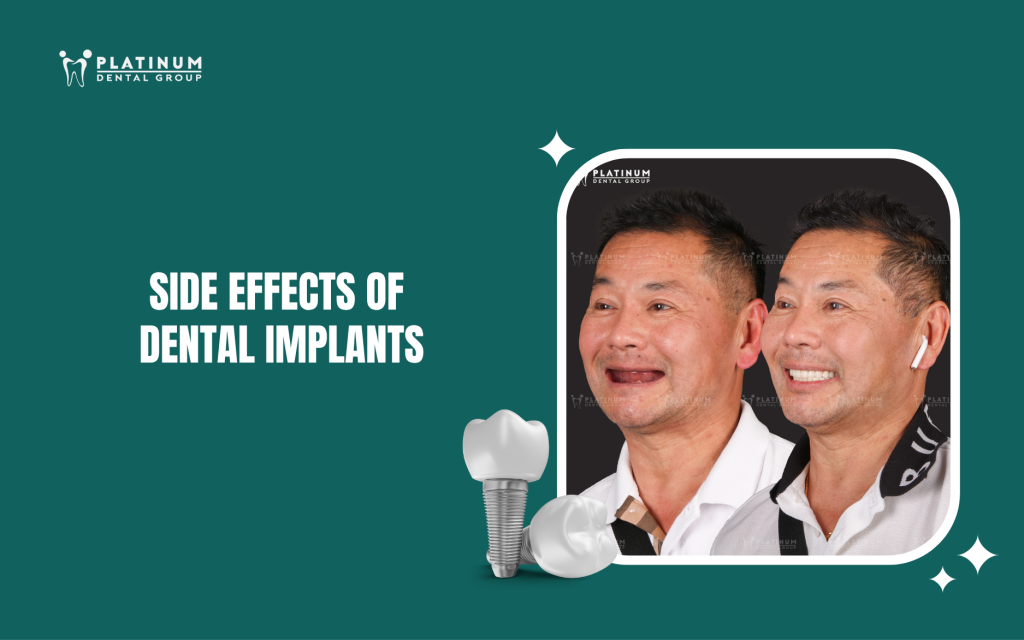Do Dental Implants Hurt? Expert Answers and Effective Pain-Reduction Tips
Many patients considering dental Implants wonder, “Do dental Implants hurt?” That’s completely understandable, as the procedure involves surgery within the jawbone. With clinical experience and modern technology, the doctors at Platinum Dental Group will help you understand the process, the expected level of discomfort at each stage, and post-operative care to minimize any unpleasant feelings—so you can feel confident choosing this optimal tooth-replacement solution.
Nội dung bài viết
Do dental Implants hurt?
This is one of the most common questions patients ask before proceeding with Implant surgery. In reality, thanks to modern anesthetic techniques used in dentistry—such as local anesthesia and conscious sedation—the Implant procedure is typically gentle and efficient.
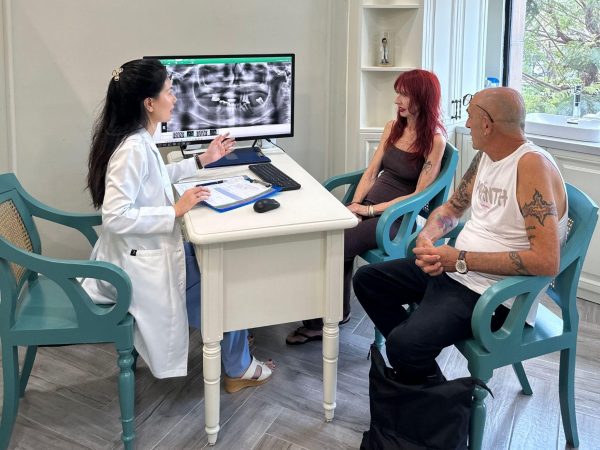
Under the effect of anesthesia, patients generally feel little to no pain during Implant placement. Before the Implant fixture is inserted into the jawbone, the dentist numbs the tissues around the surgical site—as well as adjacent areas of the cheek—to maximize comfort.
During surgery, you may feel pressure, firmness, or mild soreness rather than sharp pain. Additionally, if the tooth has been missing for a long time, the nerve fibers around the socket may be less sensitive, so discomfort can be even less than during a routine extraction.
After the procedure, as the anesthetic wears off, patients may experience mild aching around the Implant area, the chin, cheek, or beneath the eye. Minor side effects such as slight bleeding or bruising on the gums or skin can also occur.
To ensure your comfort, the doctor will also prescribe pain medication. It is common for many patients to feel some soreness the following day, but this discomfort typically resolves by the second or third day after taking the medication as directed.
The level of post-operative soreness varies by individual but usually subsides quickly—often within about two days—and does not persist. Therefore, the question “Do dental Implants hurt?” can be answered as: there may be mild, manageable discomfort, but it is well within control with proper care and guidance.
Implant Placement Procedure at Platinum Dental Group
To help you feel at ease when choosing this method, below is the medically standardized dental Implant process at Platinum Dental Group. Each step is closely monitored by our dentists to ensure safety and to minimize discomfort.
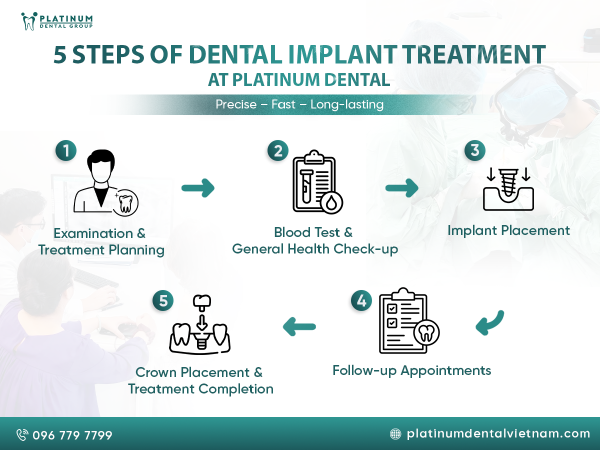
Step 1: Comprehensive Examination, 3D CT X-Ray, 3D Scan, and Consultation with Dentist
At the initial stage, the dentist will perform a general oral health check, take X-ray and 3D CT scans to accurately assess bone density and the Implant site. A 3D digital impression is also taken to plan the most suitable restoration according to your mouth structure.
Based on the diagnostic results, the dentist will provide detailed consultation on the treatment method, the number of Implants needed, duration, cost, and whether bone grafting is required.
If bone loss is minimal, bone grafting can be done simultaneously with Implant placement. However, in cases of severe bone loss, a separate bone graft may be necessary, with a healing period of 3–6 months before proceeding with the Implant.
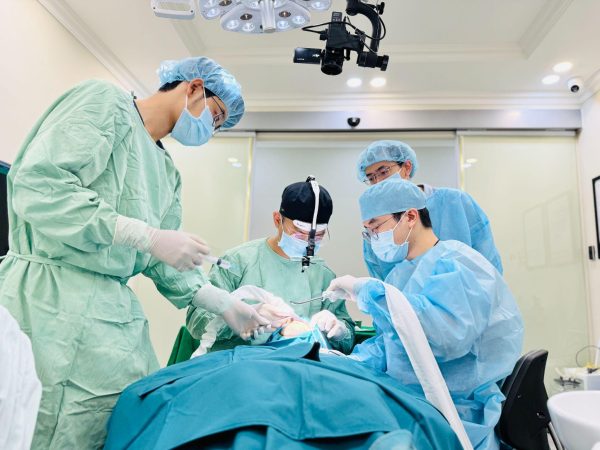
Step 2: Blood Tests and General Health Screening
Before surgery, patients will undergo blood tests and a general health evaluation, including indicators related to heart health, blood pressure, and diabetes. This step ensures that the patient is medically fit for a safe minor surgical procedure.
Step 3: Implant Placement and Temporary Tooth on the Same Day
On the day of surgery, local anesthesia is administered, so patients feel little to no pain.
The dentist will insert the Implant post into the predetermined site in the jawbone and place a temporary crown within about two hours after Implant placement.
This temporary tooth helps maintain aesthetics and basic chewing function during the osseointegration period.
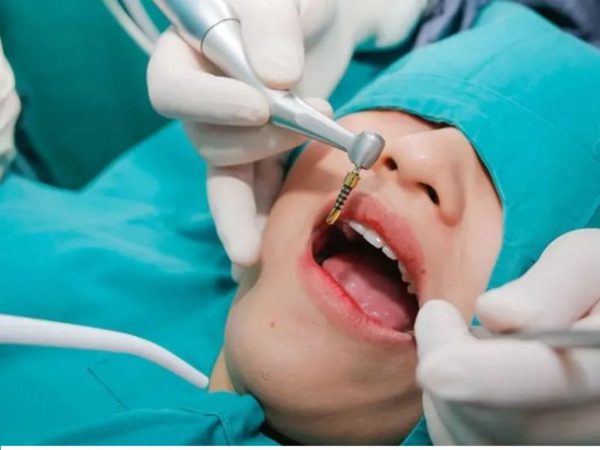
Step 4: Follow-Up Appointments
After the Implant is placed, patients must return for scheduled follow-ups so the dentist can monitor healing and the integration between the Implant and jawbone.
Regular checkups help detect and manage any abnormal signs early.
Step 5: Final Restoration (After 4–6 Months)
Once the Implant has securely integrated with the bone (usually 4–6 months), the dentist will take impressions and fabricate the final porcelain crown.
The crown will have the same shape, color, and durability as your natural teeth, fully restoring chewing function and providing a natural, lasting smile.
How Long Does Pain Last After Dental Implant Surgery?
Feeling mild discomfort after Implant placement is completely normal, as your body needs time to adapt and heal.
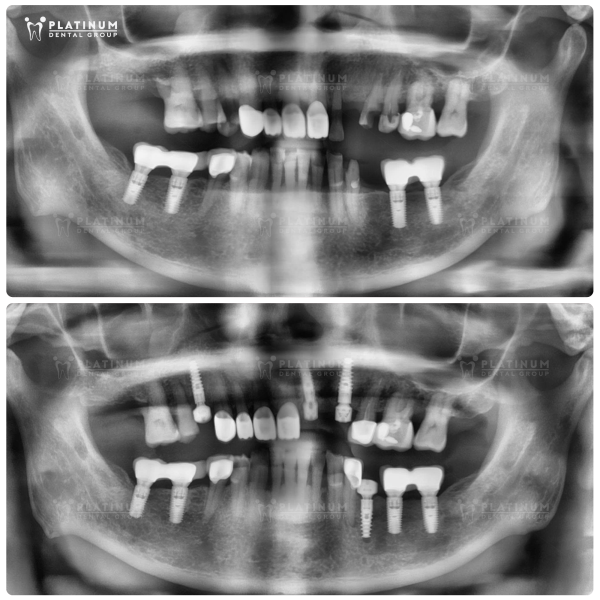
The intensity and recovery time vary per person but generally follow this timeline:
First 2–3 days: The Implant area may feel slightly swollen or sore once the anesthetic wears off. This is the body’s natural healing response.
If you follow your dentist’s instructions, take pain relievers as prescribed, and maintain proper oral hygiene, the discomfort will gradually subside.
Days 4–7: Most patients only feel slight sensitivity when chewing or touching the gum area around the Implant. Many can return to normal activities comfortably.
After 1–2 weeks: The wound has largely healed, the gums are more stable, and pain has almost completely disappeared. At this point, you can eat normally, though soft foods are still recommended.
After 1 month: The osseointegration process (bone-Implant bonding) progresses well. The Implant becomes stable and secure within the bone, and any discomfort is gone.
Overall, pain typically subsides within 3–7 days and nearly disappears after 1–2 weeks. With modern technology and the expertise of experienced dentists at Platinum Dental Group, this recovery time is even shorter, ensuring comfort and peace of mind.
At Platinum Dental Group, each successful Implant case goes beyond restoring function—it changes lives.
Mrs. T.V, who had lost several teeth and suffered from discomfort with removable dentures, shared her joyful transformation after Implant treatment.
“I lost many teeth, and the remaining ones were loose and painful. Eating was difficult, and I was afraid I’d have to wear dentures forever.
After getting Implants with Dr. Duong Minh Tung at Platinum, I could smile comfortably again within just a few days.
Now, I feel happy, confident, and truly refreshed every day.”
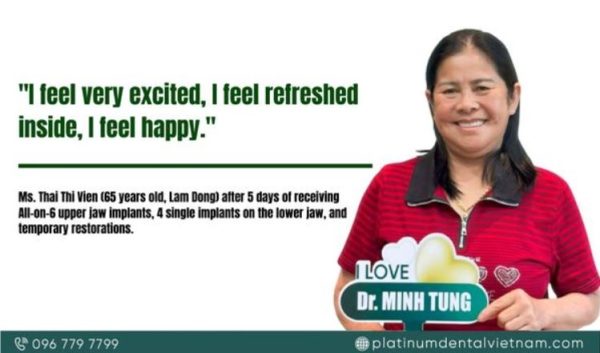
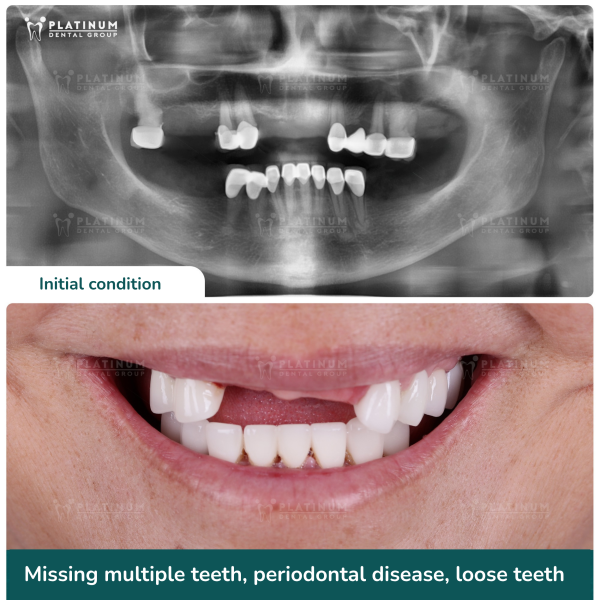
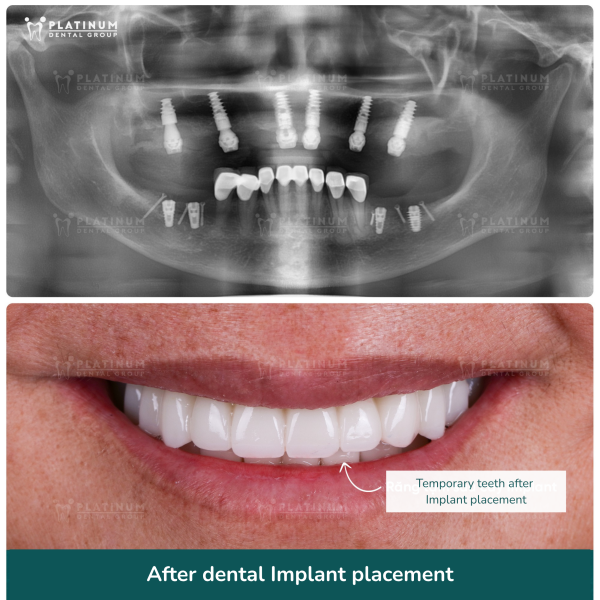
Factors That Affect Pain Level
Not everyone experiences the same level of pain after Implant surgery. The amount of discomfort depends on several factors:
Dentist’s Skill and Experience
The dentist is the most important factor determining how much discomfort you may feel after dental Implant surgery.
Their skill and experience directly affect the precision of every step — from marking the Implant position and drilling into the jawbone to placing the Implant post at the correct angle and with the right pressure.
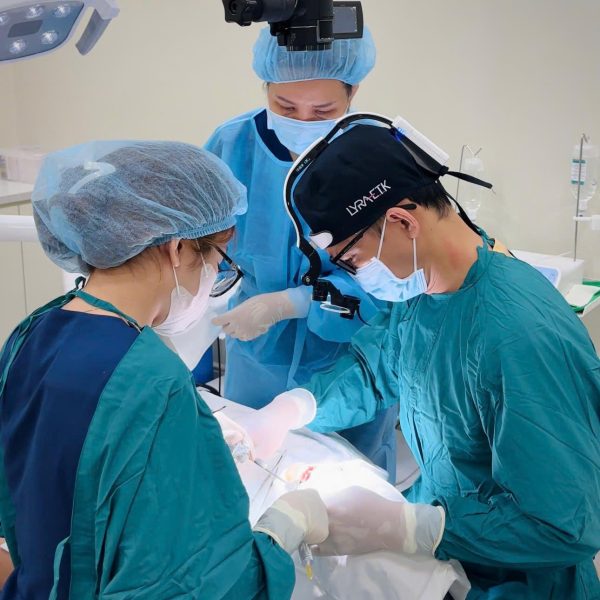
A highly skilled dentist will:
- Minimize invasiveness: Precise techniques help reduce trauma to gum and bone tissue, thereby minimizing swelling and pain after surgery.
- Optimize surgery time: A quick and efficient procedure lowers stress for patients and reduces the risk of complications.
- Anticipate and manage complex cases: Years of experience enable the dentist to handle challenges such as thin jawbone, impacted wisdom teeth, or adjacent decayed teeth with flexibility and accuracy.
- Provide personalized treatment plans: Every patient’s jaw structure is unique. An experienced dentist will select the most suitable Implant type, size, and technique to ensure long-lasting results and minimize discomfort.

Therefore, when choosing where to get dental Implants, you should prioritize the dentist’s skill and experience. In Implant-based tooth restoration, the dentist is truly the deciding factor for success. During the consultation stage, the dentist accurately diagnoses jawbone condition and oral health to create a suitable Implant plan.
During surgery, precise skills and techniques ensure the Implant post is placed correctly, minimizing pain and risks. After treatment, the dentist closely monitors your healing process, promptly addresses any issues, and provides proper care instructions.
In short, the effectiveness and safety of an Implant case depend largely on the expertise, experience, and dedication of the dentist.
Modern Technology and Equipment
Advanced technologies such as Cone Beam CT 3D imaging and digital Implant simulation software allow dentists to plan Implant placement with high precision and perform procedures efficiently.
This not only shortens surgery time but also minimizes soft tissue trauma, helping patients experience less pain and faster recovery.
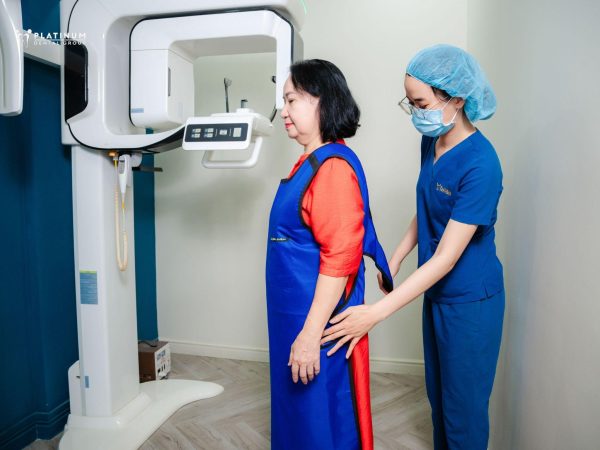
Implant Material Quality
High-quality Implant posts made from pure titanium or biocompatible titanium alloys integrate well with the body. This ensures smooth bone integration, reduces inflammation, and minimizes post-surgery discomfort. In contrast, low-quality materials may lead to complications and prolonged pain.
Individual Health and Number of Implants
Each person has a different pain tolerance and healing capacity. Patients in good overall health tend to experience less swelling and recover more quickly.
Additionally, placing multiple Implants in a single session can cause slightly longer discomfort compared to inserting just one Implant.
How to Reduce Pain After Dental Implant Surgery
Although mild discomfort after Implant placement is completely normal, you can effectively minimize and manage it by following your dentist’s post-operative care instructions.
Painkillers and Anti-Inflammatories
After Implant surgery, your dentist will prescribe appropriate pain relief and anti-inflammatory medication. Take your medicine exactly as prescribed—correct dosage, correct timing—and never self-medicate. Following medical instructions helps control pain and reduces the risk of infection.
Cold Compress
Within the first 24 hours, apply a cold compress to the outside of your cheek near the Implant area to minimize bleeding and swelling. Each application should last about 10–15 minutes, followed by a 5-minute break before repeating.
Avoid continuous, prolonged icing to prevent skin frostbite.
After the first 24 hours, switch to warm compresses to reduce swelling and bruising.

Soft Diet – Avoid Hard, Hot, or Spicy Foods
Your diet plays a key role in the healing process. Opt for soft, easy-to-chew foods such as porridge, soup, milk, and smoothies. Avoid foods that are too hard, hot, or spicy, as they can irritate the gums and slow down wound healing.
Rest, Avoid Strenuous Activity, and Do Not Smoke
Your body needs rest to regenerate bone and tissue around the Implant. During the first few days, avoid heavy physical activity or overexertion. Most importantly, avoid smoking and alcohol, as these can cause infection and interfere with healing.
Gentle Brushing and Oral Hygiene
Continue brushing your teeth regularly, but use a soft-bristled toothbrush and brush gently to avoid disturbing the Implant site. You can also rinse with saline solution or a dentist-approved mouthwash to keep your mouth clean and prevent infection.
Follow-Up Visits
Attend your scheduled follow-up appointments so the dentist can monitor healing, check bone integration, and promptly address any abnormalities. This step is essential to ensure long-term comfort and Implant success.
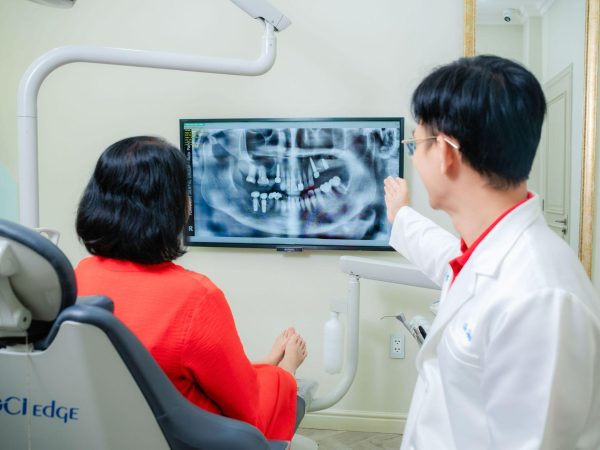
Frequently Asked Questions
How long should I rest after Implant placement?
Typically, you should rest for about 30 minutes to 1 hour after surgery to allow blood clotting. For the next 1–2 days, limit strenuous activity and prioritize rest. After that, you can resume normal routines.
How long does pain last after Implant surgery?
Pain usually lessens significantly after 3–5 days and almost disappears within 1–2 weeks, depending on each person’s healing ability. Following your dentist’s instructions will help speed up recovery.
Do lower jaw Implants hurt more?
Since the lower jawbone is dense and strong, placing Implants here is usually straightforward.
With local anesthesia, you will not feel pain during the procedure—only mild soreness for a few days afterward.
Do molar Implants (back teeth) hurt?
Molars are the main chewing teeth, so many patients worry about this area.
However, with modern techniques and experienced dentists, Implant placement for molars causes minimal discomfort.
Any soreness typically fades after a few days, allowing you to eat normally again.
Is getting an Implant more painful than a tooth extraction?
Many patients are surprised to find that Implant surgery is often less painful than a tooth extraction.
This is because the procedure is minimally invasive, performed under anesthesia, and causes less tissue trauma.
Is general anesthesia required for dental Implants?
Usually, local anesthesia is sufficient, keeping patients relaxed and fully conscious.
In cases requiring multiple Implants or when patients feel anxious, the dentist may recommend mild sedation under the supervision of an anesthesiologist to ensure safety.
Dental Implants are a modern, safe, and long-lasting tooth replacement solution.
Any post-surgery discomfort is usually mild and manageable, thanks to advanced anesthetic techniques, modern technology, and proper care.
The most important factor is choosing a reputable dental clinic with experienced and dedicated dentists to ensure both aesthetic and health results.
At Platinum Dental Group, we are committed to providing patients with a gentle, low-pain, and fast-healing Implant experience.
If you have questions or want a detailed consultation about your dental condition, contact us today — our specialists are ready to guide you on your journey to a confident and healthy smile.
Contact us now for free and personalized consultation!
Learn more:
- An introduction to Dental Implants Vietnam
- What is Dental Veneer? Types of Dental Veneers available at Platinum Dental Group
- Dental Implants Cost at Platinum Dental Group
- What is cosmetic dental crown? Advantages of cosmetic dental crowns
- Essential details related to all on four Dental Implants
- Overview of full mouth Dental Implants
Platinum Dental Group
Clinic Locations:
📍Platinum Dental Central: 127 Nguyen Cu Trinh Street, Cau Ong Lanh Ward, Ho Chi Minh City
📍Platinum Dental Thao Dien: 1H Street 10, An Khanh Ward, Ho Chi Minh City
📞 Hotline: (+84) 28 3920 9969 | 096 779 7799
✉️ Email: info@platinumdentalvietnam.com
🌐 Website: https://platinumdentalvietnam.com/
💬 Instagram: https://www.instagram.com/platinumdental.vietnam/
🔗 Facebook: https://www.facebook.com/platinumdentalvn



 Tiếng Việt
Tiếng Việt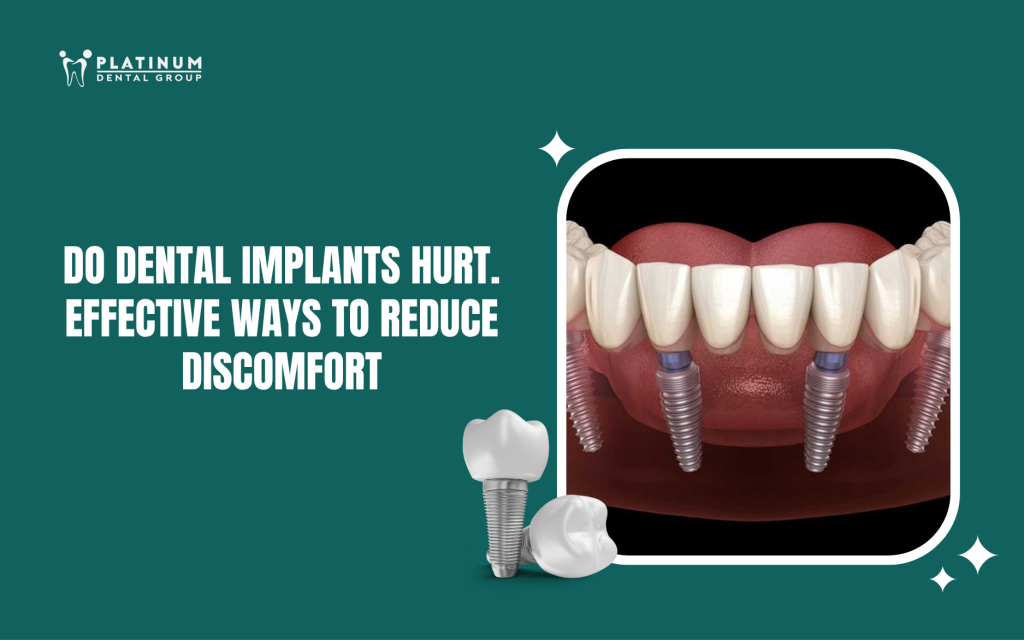
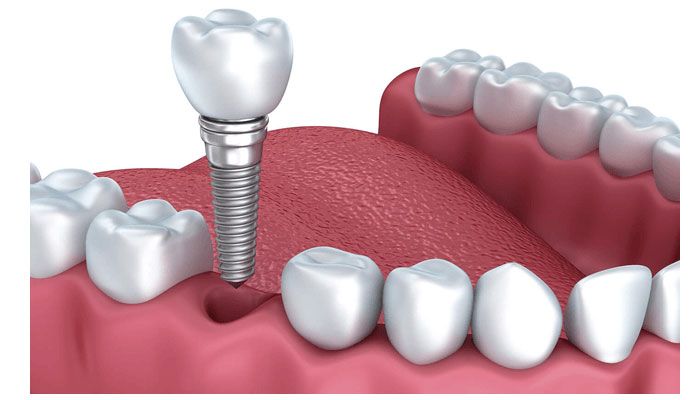

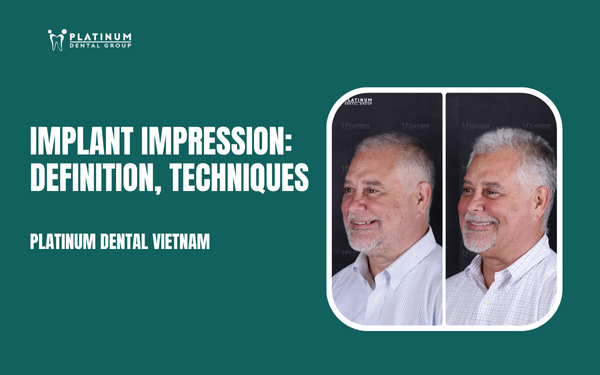
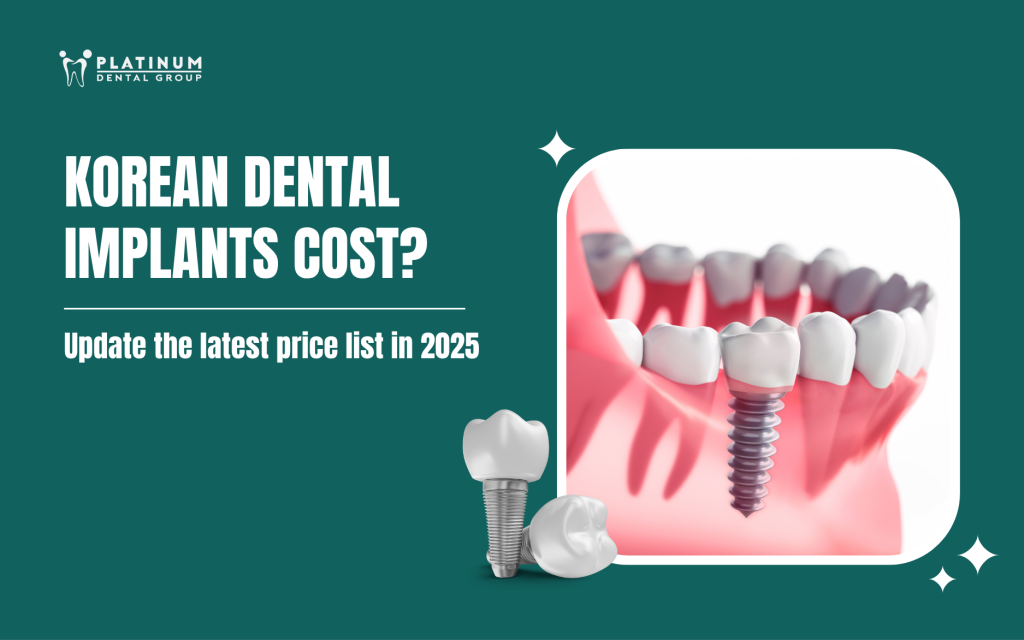




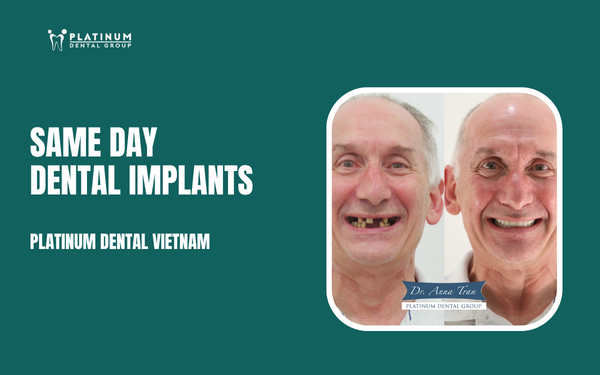
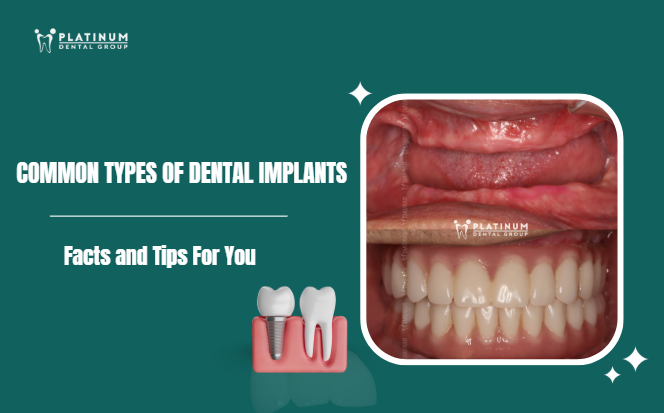
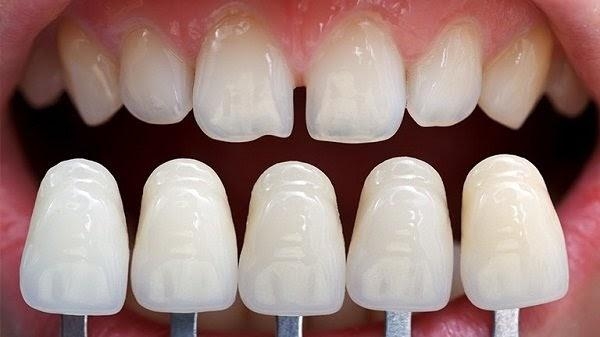
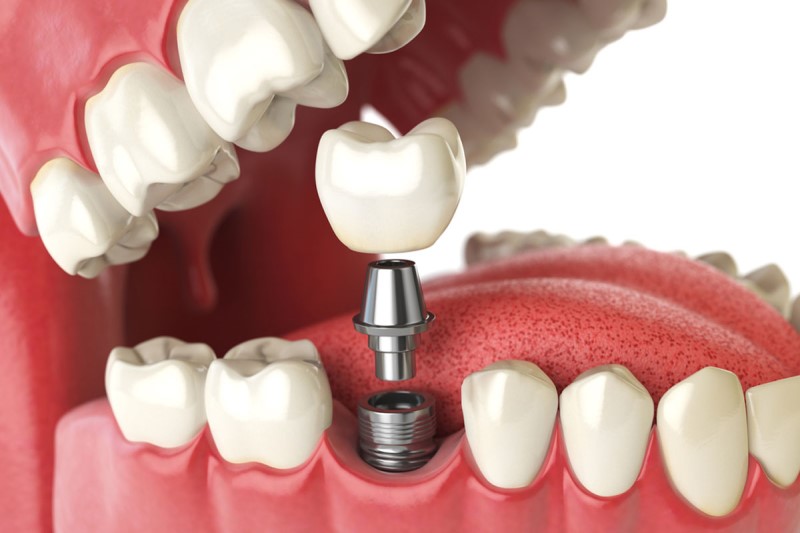

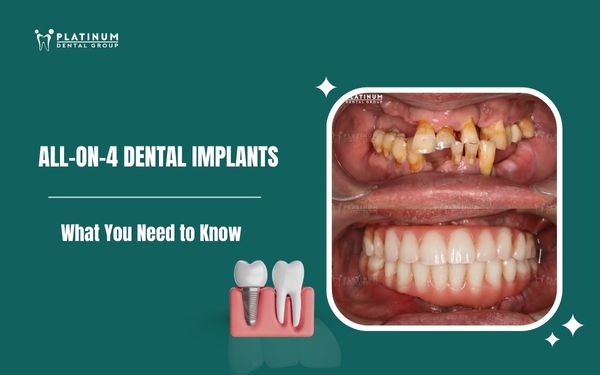
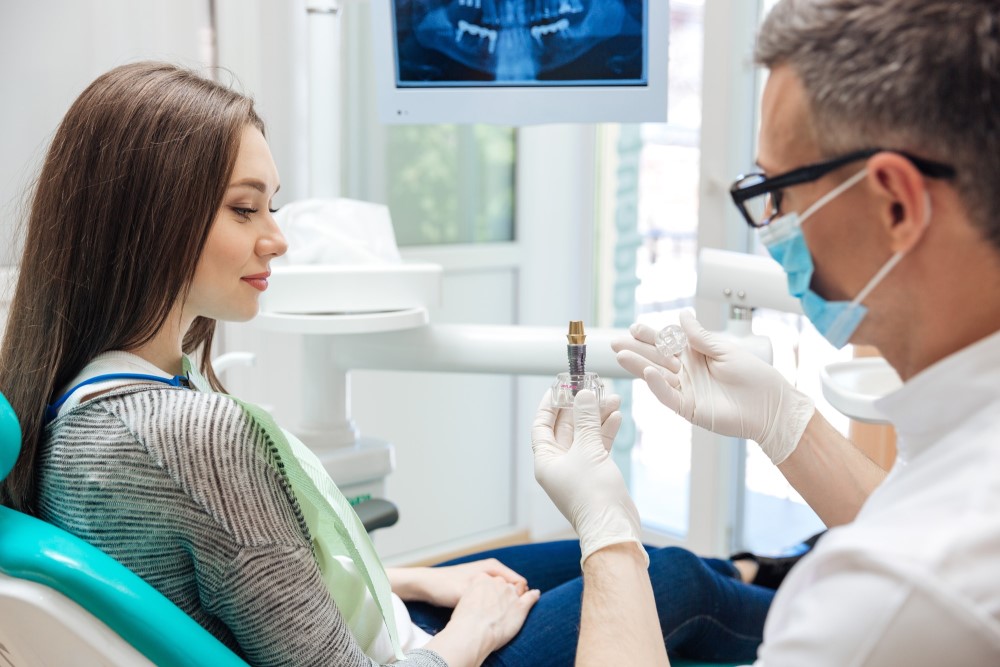


![[Updated 2025] How long does the dental implant process take? Influencing factors 32 how long does the dental implant process take](https://platinumdentalvietnam.com/wp-content/uploads/2025/11/how-long-does-the-dental-implant-process-take-4.jpg)
